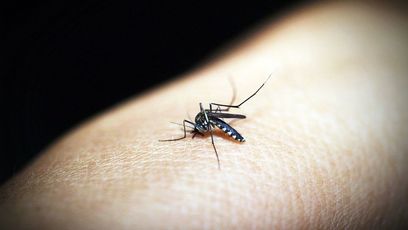|
Pretravel health research— not something people typically think about when they’re packing their flip flops and sunscreen for a sunny vacation in the tropics. Unfortunately, mosquitos love the warm temperatures just as much as humans do. Without the knowledge of proper mosquito bite prevention strategies, vacationers are put at risk for catching viruses carried by mosquitos. Chikungunya is caused by Chikungunya Virus that is transmitted to human by mosquitoes. Chikungunya outbreaks have been observed in countries in Africa, Asia, Europe, and the Indian and Pacific Oceans. But Chikungunya spread to Americas in 2013, and by the end of 2014, about 1 million suspected and confirmed cases of Chikungunya were reported across 43 countries in the Americas. Infected people start feeling symptoms about a week after being infected by a Chikungunya-carrying mosquito, the most common of which are a high fever and joint pain. Although most patients start feeling better within a week, many experience prolonged joint pain up to several months. There is no vaccine against Chikungunya, so the best way to prevent infection is making sure that people are educated about the virus and instilling mosquito bite prevention practices. However, there is no information regarding how many travelers are aware of Chikungunya and prevention methods. To answer this question, the Center for Disease Control and Prevention (CDC) investigated what percentage of travelers to the U.S. Virgin Islands are aware of mosquito-borne diseases (Chikungunya and other viruses) and mosquito bite prevention measures. Visitors to Virgin Islands National Park on St. John were asked tocompleted a questionnaire addressing knowledge related to mosquito-spread diseases and prevention measures.446 of 783 travelers completed the survey. According to the survey results, more than half of respondents were unaware of Chikungunya virus. Moreover, the majority responded that they had not been wearing clothing treated with an insect repellent or long-sleeve shirts/pants, or using bed nets for the past three days. Overall, this survey showed that most visitors arrive the U.S. Virgin Islands without adequate pre-travel research and knowledge about mosquito safety. As the number of international travelers increases each year, this survey data strongly emphasizes the urgent need for developing creative ways to encourage pre-travel health research among travelers. Original research paper can be found here: http://www.sciencedirect.com/science/article/pii/S1477893916301181 Can't access the original article? Find out more details about this article on our database: http://www.opensciencedb.com/federal-agency-research-db.html#federal-research-db/medical-research-db-detail/58c85da861c73e272e9b630d/ For additional readings: Bill Gates blog entry: https://www.gatesnotes.com/Health/Most-Lethal-Animal-Mosquito-Week NPS, safety: https://www.nps.gov/viis/planyourvisit/safety.htm NPS, mosquito borne disease: https://www.nps.gov/viis/planyourvisit/mosquito-borne-disease.htm NPS/CDC, Chikungunya: https://www.cdc.gov/chikungunya/ |
AuthorsWe are grad students and scientists dedicated to disseminating Are you a student or postdoc? We need your help to deliver scientific facts to the public!CategoriesArchives |
|
|



